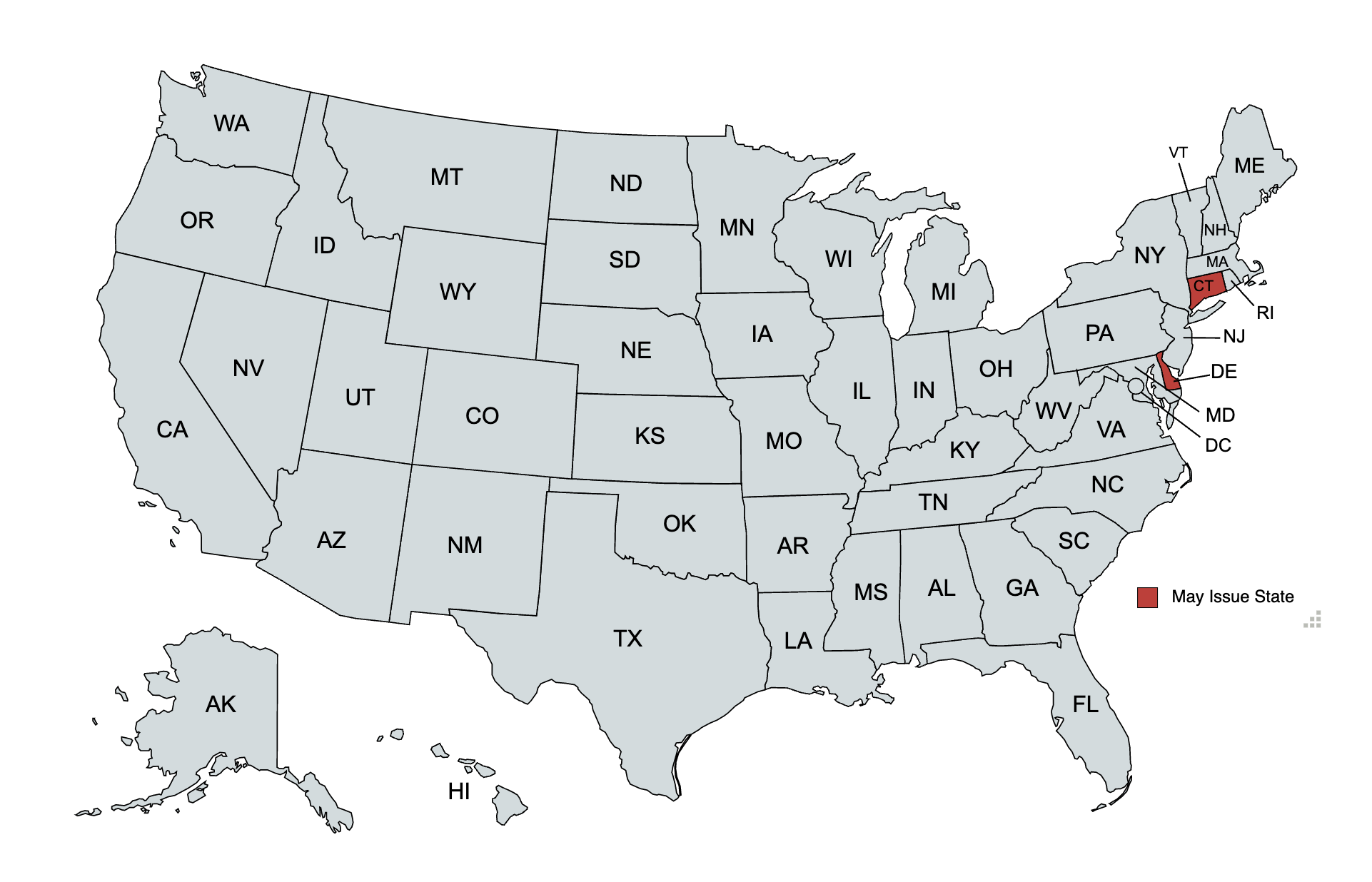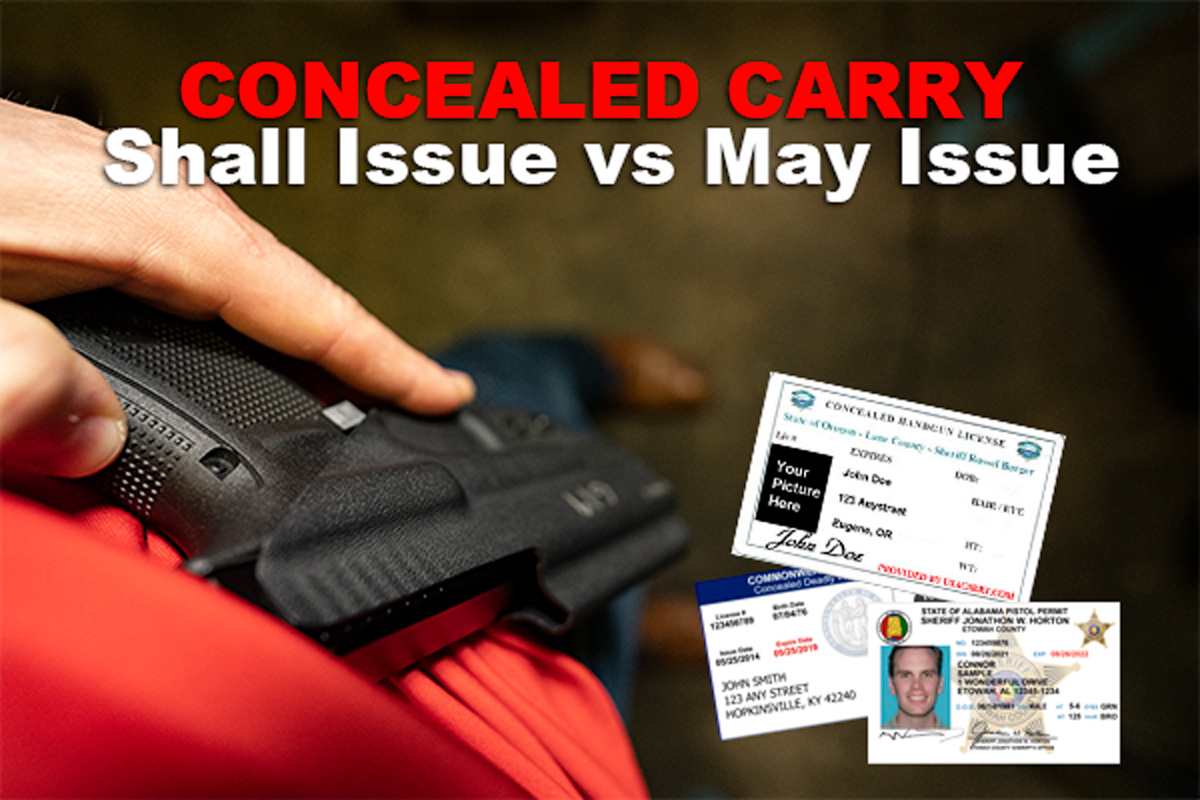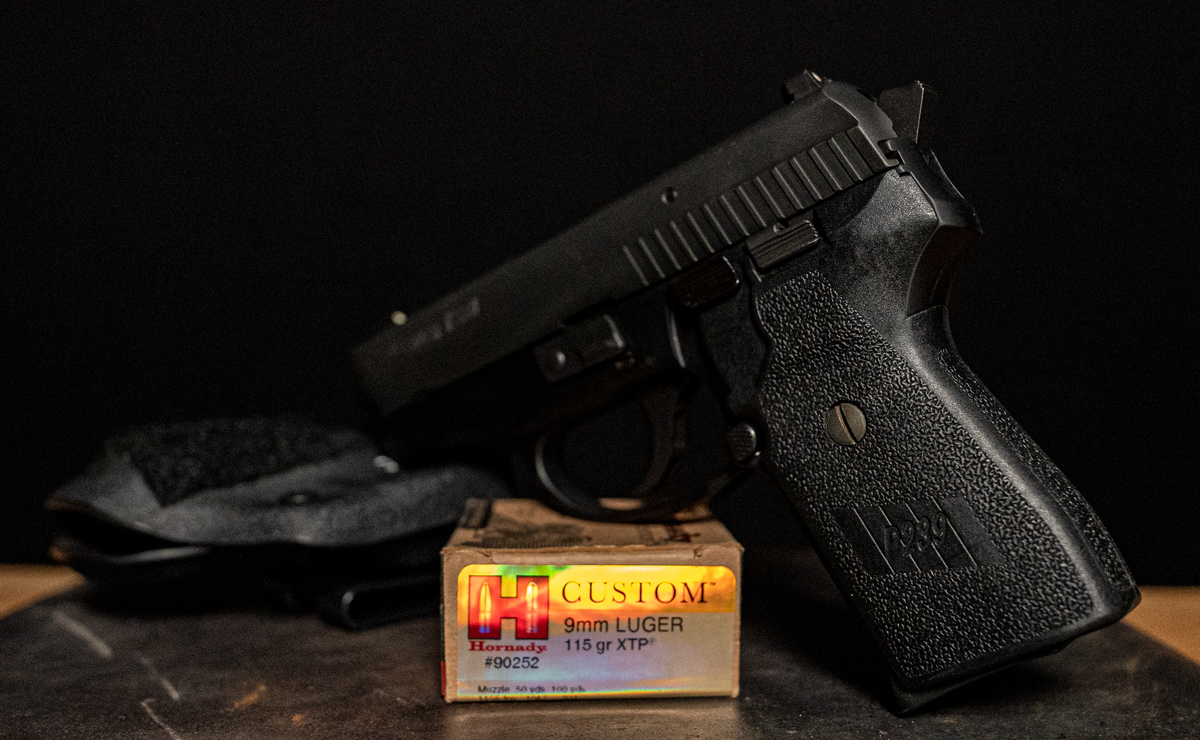A look at what it means for a state to be “shall issue” versus “may issue” for concealed carry permits and how it can impact you as a gun owner.
“The powers not delegated to the United States by the Constitution, nor prohibited by it to the states, are reserved to the states respectively, or to the people.” – Amendment X of the United States Constitution (The Tenth Amendment)
The Tenth Amendment of the United States, in essence, says that if a certain power or decision-making process is not a specific responsibility of the national government, it is the duty and responsibility of each state.
Basically, it says that the U.S. government does X, Y, and Z…and everything else is the states’ problem.
Sounds simple enough, but for gun owners, the Tenth Amendment creates massive complexities from state to state. It’s the reason (more or less) that gun owners in one state have the right to own a handgun without registering the weapon, while just across the state line that same weapon would need to be registered. It’s how an AR-15 can be illegal in California but perfectly legal in Tennessee.
The fingerprints of the Tenth Amendment are also seen on laws that give the right to carry a concealed weapon. For concealed-carry permits, some states are “shall-issue,” while others are “may issue.” This has a profound impact on gun owners who want to carry a weapon for personal defense.
What is Shall Issue?
Although some states have no concealed-carry restrictions (meaning you can carry a concealed pistol regardless) most require citizens to have a state-issued permit. If you want to carry a concealed pistol when in public, you need to go through the proper channels, meet specific requirements, attend classes, and, in most cases, have at least some live-fire training. The permit application is reviewed by law enforcement offices, usually a county sheriff’s office.
Shall Issue:
In a “shall issue” state, the sheriff or law-enforcement officer is required to issue a concealed-carry permit to anyone that meets the listed requirements. If the applicant meets all the requirements and does not have a background that would disqualify them, the sheriff is legally required to issue the permit. In other words, the sheriff, attorney general, administrator, or bureaucrat does not have the right to stop someone from getting a license.
Shall-issue states, however, are not all the same. Each state has different requirements and restrictions for conceal-carry applications. For example, some may disqualify applicants with convictions for non-violent crimes, while others allow non-violent offenders to obtain a concealed-carry permit. Shall-issue laws say that you can get a permit if you meet the state’s requirements. But each state has different requirements, so there are still differences on a state-to-state level, even if both are shall-issue locations.
May Issue:
In a “may issue” state, the sheriff or administrator has the right to deny a permit even if the applicant meets baseline requirements. Although the details can be different, in these states the citizen often has to prove they need a concealed firearm to protect themselves against a specific threat.
Do You Live in a Shall Issue State?

Thanks to that tricky Tenth Amendment, a citizen’s chances of getting a conceal-carry permit depend largely on the state in which they live. Some states are shall-issue, while others are may-issue. But, as we will discuss, may-issue states are on the decline.
According to the United States Concealed Carry Association, 48 states, as well as the District of Columbia, are “shall issue” states. Only Delaware and Connecticut are may-issue states, which means the vast majority of American citizens now live under shall-issue laws.
That said, the list of current shall-issue states and jurisdictions:
- Alabama
- Alaska
- Arizona
- Arkansas
- California
- Colorado
- District of Columbia
- Florida
- Georgia
- Hawaii
- Idaho
- Illinois
- Indiana
- Iowa
- Kansas
- Kentucky
- Louisiana
- Maine
- Maryland
- Massachusetts
- Michigan
- Minnesota
- Mississippi
- Missouri
- Montana
- Nebraska
- Nevada
- New Hampshire
- New Jersey
- New Mexico
- New York
- North Carolina
- North Dakota
- Ohio
- Oklahoma
- Oregon
- Pennsylvania
- Rhode Island
- South Carolina
- South Dakota
- Tennessee
- Texas
- Utah
- Vermont
- Virginia
- Washington
- West Virginia
- Wisconsin
- Wyoming
The only two remaining may-issue states are:
- Connecticut
- Delaware
Note: State laws are always changing, and national laws could be adjusted based on decisions by the Supreme Court, Congress, state legislatures, and lower federal judges. This article was written to the best of our knowledge based on information currently available, but there is always a chance that your state may become a shall-issue or move from shall-issue to another system.
The Future of Conceal-Carry Permits
California is a shall-issue state. New York is a shall-issue state. Massachusetts is a shall-issue state.
This may seem surprising, as states you might traditionally consider these gun-restriction states. It’s a recent change, as many states, either on their own or because of federal laws, are moving to shall-issue requirements.
New York, for example, was recently moved to a shall-issue state after the Supreme Court decision in NYSRPA v. Bruen, which was decided in June of 2022. Previously, government officials said that general desires for personal protection were not enough to show proper cause for a permit. The court essentially said that New York’s may-issue laws, especially the need to prove a specific danger before getting a permit, were unconstitutional.
With the overturning of the New York law, “may-issue” could be on the way out. The USCCA says that New York, Massachusetts, California, and others have been shall-issue states “since the Supreme Court’s ruling on the NYSRPA v Bruen on June 23rd, 2022.”
Some states, however, are shall-issue and may-issue. Rhode Island, for example, is a shall-issue state by state law but the attorney general still has “may-issue” powers.
National and state gun laws are always changing. It’s up to you, the responsible gun owner, to research the laws in your area and stay within the bounds set by elected officials.
Gun laws may change, but you can always find affordable rounds for personal defense, target practice, and hunting at ammotogo.com.






